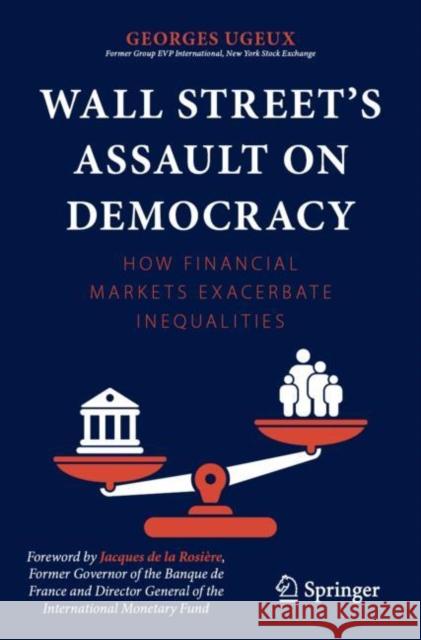Wall Street’s Assault on Democracy: How Financial Markets Exacerbate Inequalities » książka
Wall Street’s Assault on Democracy: How Financial Markets Exacerbate Inequalities
ISBN-13: 9783031290930 / Angielski
On November 24, 2020, in the midst of a global pandemic, the Dow Jones Index surpassed 30,000 points for the first time ever. This historic moment exposed the incredible disconnect between financial markets and society.The stock market’s one hundred percent rebound was triggered by a massive injection of capital by the US Federal Reserve and by fiscal stimulus measures that reached $16 trillion globally in only a year. It was the taxpayer who came to the aid of the shareholders. This imbalance between low- and high-income individuals has become unbearable and calls into question the mechanisms that allow such an abuse of financial power to exist. This abuse has allowed populism to flourish, in a world where humanism should prevail.This book invites the reader to understand how such a financial drift of capitalism was even possible and proposes reforms to correct the system. Written by the former Group Executive Vice President for International & Research at the New York Stock Exchange, this volume provides concrete solutions for democratizing financial markets and reintroducing the morals and ethics that these markets and its leaders are so sorely lacking.Ugeux argues that the purpose of such reforms is to reduce the inequalities which are plaguing our democracies. Citizens are losing hope that equity exists in the system and it has become clear, as fundamental liberties like right voting rights are being threatened – that the problem lies much deeper. Ugeux insists that a change of perspective and a redefinition of societal goals is essential: social and solidarity capitalism is possible only if our leaders listen to the expectations of their citizens.While it is supported by research and facts, this book includes elements of opinion essays with an educational objective. It aims to educate readers who want to better understand these complex issues, without having to be specialists.
On November 24, 2020, in the midst of a global pandemic, the Dow Jones Index surpassed 30,000 points for the first time ever. This historic moment exposed the incredible disconnect between financial markets and society.The stock market’s one hundred percent rebound was triggered by a massive injection of capital by the US Federal Reserve and by fiscal stimulus measures that reached $16 trillion globally in only a year. It was the taxpayer who came to the aid of the shareholders. This imbalance between low- and high-income individuals has become unbearable and calls into question the mechanisms that allow such an abuse of financial power to exist. This abuse has allowed populism to flourish, in a world where humanism should prevail.This book invites the reader to understand how such a financial drift of capitalism was even possible and proposes reforms to correct the system. Written by the former Group Executive Vice President for International & Research at the New York Stock Exchange, this volume provides concrete solutions for democratizing financial markets and reintroducing the morals and ethics that these markets and its leaders are so sorely lacking.Ugeux argues that the purpose of such reforms is to reduce the inequalities which are plaguing our democracies. Citizens are losing hope that equity exists in the system and it has become clear, as fundamental liberties like right voting rights are being threatened – that the problem lies much deeper. Ugeux insists that a change of perspective and a redefinition of societal goals is essential: social and solidarity capitalism is possible only if our leaders listen to the expectations of their citizens.While it is supported by research and facts, this book includes elements of opinion essays with an educational objective. It aims to educate readers who want to better understand these complex issues, without having to be specialists.











